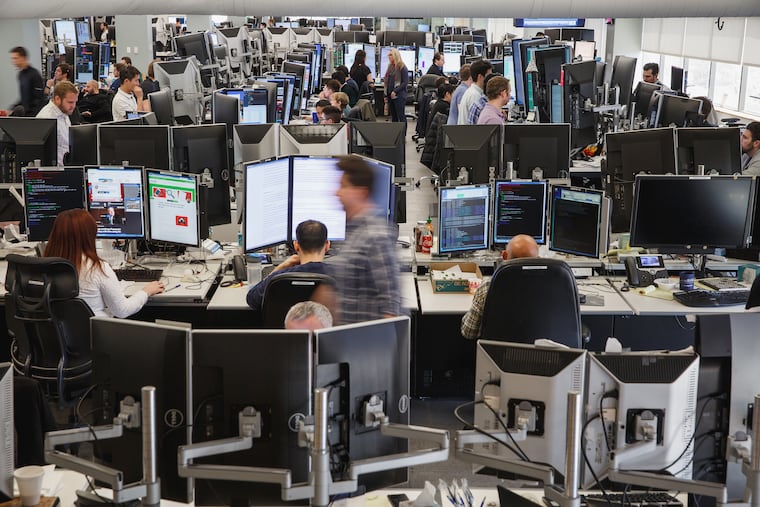Pa.’s richest man is jetting 100 people to the Super Bowl — and betting on Eagles’ victory
Billionaire Eagles fan Jeff Yass is building a sports-betting empire at his Susquehanna International Group

The Eagles are a narrow favorite to win the Super Bowl — by less than two points, according to bookmakers who take sports bets from gamblers.
But Jeffrey S. Yass, the professional oddsmaker whose firm, Susquehanna International Group, relentlessly weighs and revises probabilities that inform its bets on stocks, options, commodity contracts and other securities, says he doesn’t think that Sunday’s game will be nearly so close.
“The math guys don’t get it. This will be a game of destiny, and we are gonna crush it. I guarantee a 28-10 win,” Yass said, laughing, in a conference room overlooking City Avenue, down the hall from the two-story, screen-filled trading room.
Susquehanna will have its own cheering crowd at Sunday’s game in Arizona against the Kansas City Chiefs. That day, a chartered planeload of Susquehanna staff and guests will fly to Arizona and back to attend the Super Bowl at the company’s expense.
The 50 winners were selected by a lottery, held last fall when the Eagles were 5-0 and the Super Bowl began to look possible. Each of the 50 lucky Susquehanna staffers gets to bring a guest. If the Eagles win, all 2,500 of Susquehanna’s employees gets a $1,000 bonus.
“I guarantee a 28-10 win.”
“We’ve had a lot of these sweepstakes over the years,” Yass said. About 20 Susquehanna employees won tickets by lottery when the Phillies made the World Series last season, and firm members have previously won cash prizes for guessing Triple Crown and NCAA Final Four winners.
But “this has been by far the biggest excitement,” said Yass, head of the group who founded the firm in 1987. It now employs more than 2,500 people. Its trading profits, reinvested in private companies around the globe, have made Yass the richest man in Pennsylvania, according to Forbes, and fueled his political contributions, often in support of charter schools.
From ‘Moneyball ' to the Main Line
Susquehanna’s large Super Bowl delegation signals an interest in sports that extends beyond staff perks.
Leaders of the Bala Cynwyd firm, long known for making quick, strategic pivots to increase profits, watched with fascination as “sports analytics” — the use of digital plays-and-probabilities strategies similar to securities analysis — gained popularity in the early 2010s following the release of Moneyball, the book and film that chronicled the success of the Oakland Athletics’ 2002 season using these tactics. Player selection and play-calling were among the first sports functions to be subject to digital analysis and recommendations.
Could sports betting be far behind, opening up a new profit highway for Susquehanna and its Wall Street rivals?
A 1992 federal law barred most sports gambling. But New Jersey and other casino states began agitating in favor of sports betting as digital oddsmakers began proliferating in other countries. In 2017, Susquehanna set up its own sports analytics unit, Ireland-based Nellie Analytics, which began calculating odds and taking bets from European sports gamblers, including on U.S. pro games.
“We had an interest in sports and sports betting. We anticipated it might come to the USA,” said David Pollard, Susquehanna’s head of strategic planning and special counsel.
Americans were still blocked from participating — until 2018, when the U.S. Supreme Court struck down the ban.
As states, including Pennsylvania and New Jersey, responded by legalizing sports betting, Susquehanna took another step into the business last year, investing $65 million in PointsBet, an Australia-based firm which now takes online sports bets in 14 of the 20 U.S. states that have authorized the practice. “It’s expanding. We think it is here to stay,” Pollard said.
The firms offer “in-game” bets as odds change, starting with the opening kickoff. For example, at the Super Bowl, “if the Eagles start with a 53% probability of winning the game, after the first play, the situation will change,” Yass said. “If the Eagles run it back for a touchdown, [their win probability] may go to 60%. If they fumble, it may go to 40%.”
For now, each state that allows sports betting has its own group of competing providers.
“It’s not like the stock options market, where someone in Kansas can trade with someone in Delaware. The market is very fragmented, and that makes it expensive,” Yass said.
He’s looking forward to a day when sports betting is legal in all states — and also between gamblers in different states, instead of smaller, state-by-state markets. He said a national sports-betting market can be expected to attract more and larger bets and drive down fees and other trading costs for bettors.
Impact on the field?
In-game bets can bless some coaching decisions with improved odds, while punishing others.
Pollard notes that bettors have been more aggressive when football teams make clear they plan keep control of the ball on a fourth down, in hopes of converting it to a new first down, while betting against others when they trot out a kicker to punt the ball away on hopes it will gain defensive field possession.
Do coaches feel pressure to respond to gamblers’ preferences? Pollard pointed out that the analytics used to calculate such bets developed before betting became legal. It’s the technology that has pointed the way toward favoring some plays over others, and bets have followed — whether or not coaches embrace them, too, he said.
“The industry is still finding its way,” Pollard concluded. “It is increasingly popular. It’s expanding. We feel it is here to stay.”